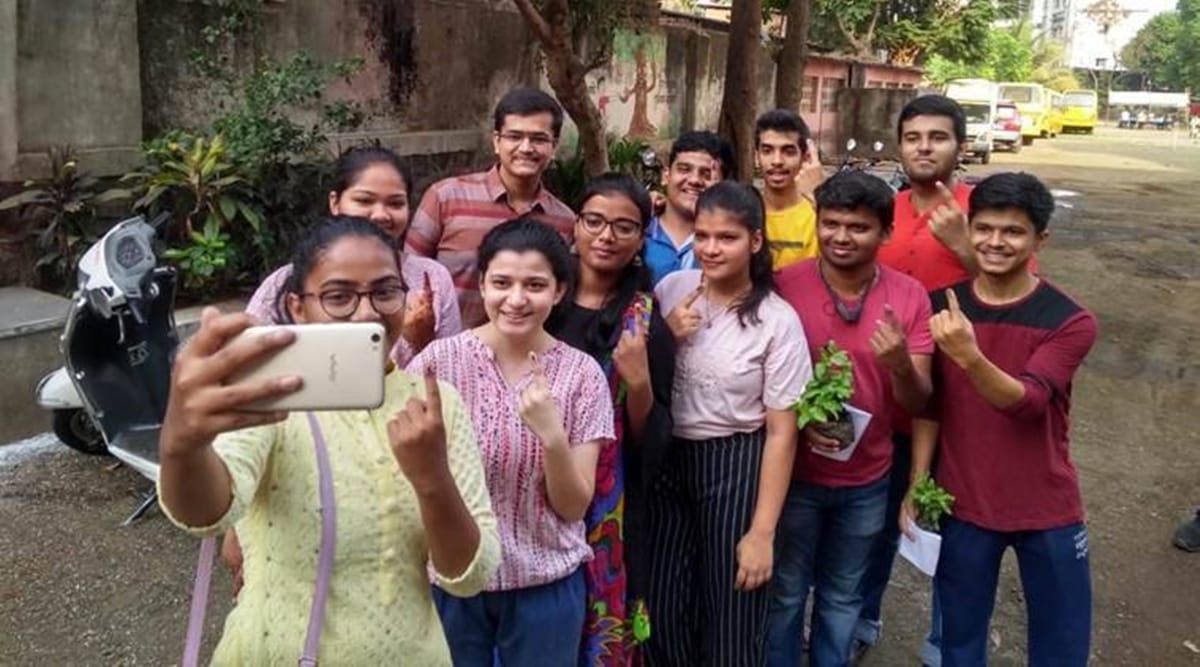 The unique digital characteristics of this demographic of first-time voters will require creative approaches for political engagement ahead of the 2024 elections. (Express/File)
The unique digital characteristics of this demographic of first-time voters will require creative approaches for political engagement ahead of the 2024 elections. (Express/File)The recently released IAMAI Kantar, Internet in India, ICUBE 2021 study has some interesting findings on how the country is fast emerging as one of the world’s largest markets for internet-based apps and services. The report was released around the same time India witnessed significant bidding for the 5G spectrum. At the intersection of both of these lies perhaps the world’s most unique digital polity of first-time, non-English internet users who think, act and transact “mobile first”. Their numbers will soon reach a billion as India focuses efforts on expanding rural 4G access and high-speed internet. With anywhere between two to eight hours of daily usage, the Indian internet user is the ideal test case for any platform or app-based service looking to tap a global audience. Little wonder that we have witnessed over the years intense efforts to sway the Indian internet user through borderless activism in the name of “saving the internet”, “online free speech”, and “data surveillance”.
With the Narendra Modi-led NDA government withdrawing the earlier proposed Personal Data Protection Bill, the stakes have become even higher for borderless activism seeking to influence how India regulates the internet-based economy.
The reasons for the high stakes in internet regulation in India become apparent when one looks at the demographic shift in the country — the statistics revealed by the IAMAI report also underline this shift. As per the UN’s estimates for births in India, the cohort born between 2002 and 2006 is one of the largest, with yearly births having peaked in the country between 2001 and 2002. This makes the cohort of nearly 150 million first-time voters in the 2024 General Elections a sizable and distinct digital constituency. As India’s largest cohort that has been “Digital First” from the cradle, this generation of first-time voters has experienced all the significant digital shifts in their formative years. Having been born around the same time as Facebook, YouTube and Twitter, this generation came of age with the touchscreen revolution. Their teen years witnessed an explosive growth in smartphone usage. This is also the generation that had the highest exposure to online education due to Covid-19 vastly increasing their screen time and use of internet tools and services.
While the IAMAI report does not reveal much on the age-wise demographic split of the various kinds of internet users, it was interesting to note that online gaming has nearly five times the number of users relative to those using the internet for online education. Internet-based gaming is the mainstay of this cohort with new-age interactive platforms such as Twitch and Discord emerging as hubs of their peer groups. The divide with earlier generations of voters is quite stark as this cohort barely reads newspapers or watches conventional television. While YouTube and WhatsApp are most likely their primary sources of news to them, Facebook and Twitter are already legacy social media platforms belonging to an earlier era. Indicators of this inter-generational schism are already visible the world over with older users of services like Instagram unhappy with the shift towards tik-tok style short videos and algorithmic feeds.
Subscriber Only Stories
The unique digital characteristics of this demographic of first-time voters will require creative approaches for political engagement ahead of the 2024 elections. The Election Commission of India recently announced further liberalisation of the voter registration process with 17-year-olds being able to register a year ahead of being eligible to vote, apart from opening up the voter registration process once every quarter. Creative engagement of this digital-first generation would perhaps require interactive live streaming on platforms like Twitch apart from volunteer engagement efforts through “servers” on Discord. How India approaches digital regulations would be of utmost importance to this cohort. It will necessitate a sustained dialogue on the government’s approach to techno-nationalism as a counter to the borderless activism that has sought to skew digital policy debates in India.
India is not alone in its pursuit of techno-nationalism. We are already witnessing a wave of regulatory moves from Indonesia on not just controlling online gaming apps and services but also actively promoting indigenously developed gaming apps. While China requires licences for online games by a dedicated gaming regulator, Indonesia requires formal registration to be compliant with local laws governing what are called “private electronic systems”. From Kenya to Brazil we are also witnessing preemptive actions to insulate the electoral processes of their respective democracies from the spread of viral fake news and disinformation on WhatsApp.
While the 2009 elections saw the advent of blogs in the political debate, the 2014 elections were the first time internet streaming played a significant role in disintermediating broadcast media. The 2019 elections were marked by the extensive role played by social media platforms such as Facebook and WhatsApp. With the unique demographic characteristics of first-time voters, perhaps the 2024 elections will see algorithms and gaming apps and services play an influential role.
From securing semi-conductor supply chains to regulating data flows, techno-nationalism is on the political agenda of western democracies and eastern nations alike. Over the next two years as the government seeks to put in place a comprehensive digital regulatory framework governing data, privacy, apps and algorithms, engaging the first digital generation of new voters on techno-nationalism will be crucial at every step.
The writer is former CEO of Prasar Bharati, India’s Public Broadcaster
- The Indian Express website has been rated GREEN for its credibility and trustworthiness by Newsguard, a global service that rates news sources for their journalistic standards.

